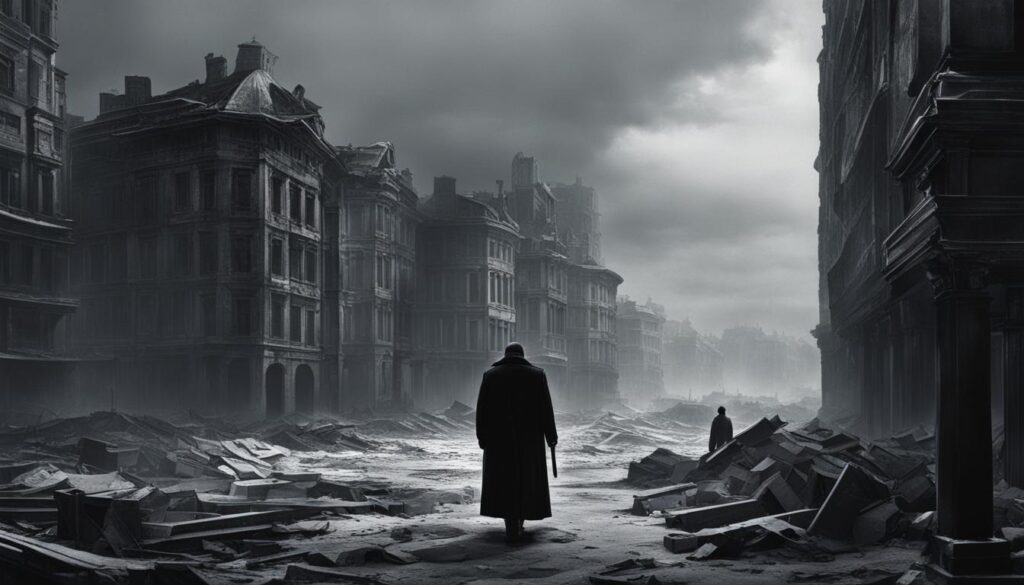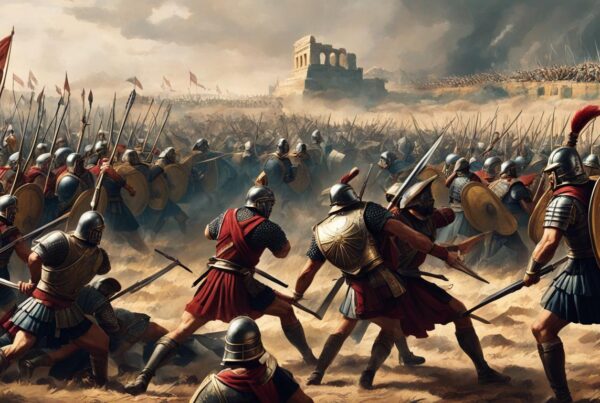George Orwell’s “1984” is a classic dystopian novel that presents a chilling vision of the future. In this audiobook review, we’ll explore the world of Oceania, a totalitarian state ruled by the omnipresent Big Brother.
As we dive into the audiobook, we’ll discover the story of Winston Smith, an individual trying to navigate a world where individual thoughts and actions are punished. We’ll analyze the narrators’ performances and production value, providing a comprehensive evaluation of the listening experience.
Follow along as we delve into the themes, literary techniques, and historical context present in “1984,” providing a thought-provoking analysis of the novel’s significance in today’s society.
About George Orwell
George Orwell was an English author and journalist known for his works of political and social commentary. Born Eric Arthur Blair in 1903, Orwell lived a fascinating life that greatly influenced his writing.
Orwell’s experiences, including his time as a colonial police officer in Burma and his observations of the Spanish Civil War, deeply impacted his worldview and the themes he explored in his writing. His works often focused on political oppression, totalitarianism, and the dangers of government control.
Orwell’s writing style is characterized by its clarity and concise prose, often using simple language to convey complex ideas. He believed that language should be used to communicate ideas, rather than to obscure them, and this philosophy is evident in his works.
Orwell’s body of work includes several critically acclaimed novels, such as “Animal Farm” and “1984”, as well as numerous essays and non-fiction works. His influence on modern political and social discourse remains relevant and significant to this day.
Influences
Orwell’s upbringing and life experiences greatly influenced his writing. He was born in India to a colonial civil servant and spent much of his early life in England. His experiences in both places contributed to his perspective on the world and influenced the themes he explored in his writing.
Another significant influence on Orwell’s work was his time as a police officer in Burma. This experience opened his eyes to the realities of British imperialism and the oppressive nature of colonialism, themes that are present in many of his works.
Orwell was also influenced by the Spanish Civil War, which he fought in on the side of the Republicans. This experience, as well as his observations of Stalinist Russia, shaped his views on totalitarianism and government control, which are central themes in many of his works.
Writing Style
Orwell’s writing style is characterized by its clarity and directness. He believed that language should be used to communicate ideas clearly and concisely, and this philosophy is evident in his writing.
Orwell’s use of simple language to convey complex ideas, as well as his focus on political and social commentary, has made his work accessible and widely read. His influence on modern political and social discourse is evident in the continued relevance of his works.
Overview of “1984”
“1984” by George Orwell is a dystopian novel set in a totalitarian society where the government, led by the enigmatic figure Big Brother, monitors every aspect of citizens’ lives. The novel follows the story of Winston Smith, a low-ranking member of the ruling Party, as he begins to question the regime and falls in love with a fellow rebel named Julia.
The novel’s setting is the bleak, oppressive city of London in the year 1984, which is depicted as a desolate and rundown metropolis controlled by the all-powerful Party. The world of “1984” is marked by strict surveillance, propaganda, and censorship, as well as a pervasive atmosphere of fear and suspicion.
The main plot follows Winston’s struggle to maintain his individuality and freedom of thought in a society that demands conformity and obedience. As he and Julia begin to rebel against the Party, they are drawn into a dangerous underground world of resistance, culminating in a chilling and unforgettable finale.
| Main Characters | Description |
|---|---|
| Winston Smith | A disillusioned party member who secretly harbors rebellious thoughts and feelings towards the government. |
| Julia | A fellow party member and Winston’s love interest who helps him defy the Party’s rules. |
| Big Brother | The enigmatic leader of the ruling Party who is worshipped and revered by its citizens. |
| O’Brien | A high-ranking member of the Party who is initially friendly to Winston but later reveals himself to be a devoted follower of the regime. |
The character development in “1984” is masterfully executed, with each figure serving as a symbol for a different aspect of society or ideology.
Themes in “1984”
In “1984,” George Orwell explores major themes of totalitarianism, surveillance, and manipulation. These themes contribute to the overall dystopian atmosphere of the book and highlight the dangerous consequences of authoritarian rule.
One of the central themes of “1984” is the idea of totalitarianism. Throughout the novel, the government exercises complete control over every aspect of citizens’ lives. The Party uses censorship, propaganda, and violence to maintain their power and suppress individual thought. This theme emphasizes the importance of free thought and the dangers of sacrificing individual liberty.
Another key theme in the book is surveillance. The government’s use of telescreens and thought police allows them to monitor citizens’ every move, making it nearly impossible to resist or rebel against their authority. This theme is particularly relevant in today’s world, where technological advancements have made surveillance tools more sophisticated and widespread.
Manipulation is another prominent theme in “1984.” In the book, the Party manipulates language, history, and even the perception of reality to assert their dominance over the people. This theme highlights the power of propaganda and the importance of critical thinking skills.
Overall, “1984” is a chilling warning against the dangers of totalitarianism, surveillance, and manipulation. The novel serves as a reminder of the importance of free thought, privacy, and individual liberty in the face of oppressive regimes.
Analysis of the Audiobook
As audiobooks continue to gain popularity, it’s essential to examine how well the narration, voice actors, and production value translate to this format. In the case of “1984,” the audiobook adaptation does justice to the original version.
The narration is engaging and helps to set the tone of the story. The voice actors do an excellent job of bringing their respective characters to life, especially in their delivery of dialogue. Moreover, the production value is top-notch, creating a listening experience that fully immerses the audience in the dystopian world of “1984.”

The attention to detail in the production of the audiobook is commendable, from the use of sound effects to the pacing of the story. The audiobook does not rely solely on the strength of the written text but also enhances it with additional audio elements.
In conclusion, the audiobook adaptation of “1984” is a fantastic complement to the original version and offers a captivating listening experience with its impressive narration, voice actors, and production value.
Impact and Relevance Today
Over seventy years since its publication, George Orwell’s “1984” remains a chilling and prophetic vision of a totalitarian future. With the rise of technology and surveillance, the novel’s themes revolving around government control and loss of privacy are still relevant in contemporary society. In an era where social media and smartphone apps gather data on every aspect of people’s lives, “1984” serves as a stark warning of the dangers of relinquishing personal freedom.
The book has been referred to in discussions surrounding contemporary issues such as government surveillance, censorship, and privacy violations. It has spawned several adaptations and has become a staple in English literature curriculums, a testament to its continued relevance in modern times. The relevance of “1984” has even led to renewed interest in some of Orwell’s other works, such as “Animal Farm.”
The Relevance of “1984” in Today’s World
Orwell’s novel warns of future authoritarian governments that are constantly monitoring, manipulating, and punishing citizens. The widespread use of technology has made this vision even more pertinent today. As individuals share increasingly more personal information online, their privacy becomes more and more vulnerable to being compromised. Governments’ ability to collect and analyze vast amounts of data has raised concerns about abuse of power and intrusion into personal lives.
The Role of “1984” in Shaping Public Discourse
The warnings of “1984” have led to continued debates on issues surrounding individual freedom, government control, surveillance, and censorship. The book has even become a symbol of resistance among political dissidents and activists, including those fighting against oppressive regimes and surveillance states.
Critical Reception
“1984” remains one of the most influential dystopian novels of all time. Its critical acclaim is well-deserved, with many reviewers praising its vivid, terrifying depiction of a totalitarian future. The novel’s literary analysis continues to inspire scholars and readers alike, who recognize its significance in the literary world.
Upon its publication in 1949, “1984” received widespread critical acclaim for its thought-provoking social commentary and dystopian elements. The New York Times hailed it as a “prophetic” and “brilliant” work, while The Guardian praised its “disturbing” and “powerful” portrayal of government oppression.
In the years since its release, “1984” has remained a staple in literary analysis and continues to provoke discussion and debate. The novel’s use of language and symbolism has been extensively analyzed, with critics and scholars exploring its themes of power, freedom, and individualism.
“‘1984’ is more than a work of fiction; it’s a warning against future societies that could become a reality unless we are careful to safeguard our freedoms.” – James O’Connor, Literary Critic
With its potent message and relevant themes, it’s no wonder that “1984” has earned such critical acclaim and continues to captivate audiences to this day.
Comparison to Other Dystopian Novels
“1984” is often considered a classic of the dystopian genre, and for good reason. However, it’s not the only influential novel in this category. Let’s take a look at some other notable dystopian works and compare them to George Orwell’s masterpiece.
| Novel | Author | Similar Themes | How does it compare to “1984”? |
|---|---|---|---|
| The Handmaid’s Tale | Margaret Atwood | Government control, surveillance, oppression of women | Both novels explore government control and the manipulation of individual freedoms in a dystopian world, but “The Handmaid’s Tale” focuses more specifically on the oppression of women. |
| Brave New World | Aldous Huxley | Government control, lack of freedom, loss of individuality | Both novels deal with the consequences of totalitarianism, but while “1984” explores the dangers of a government seeking complete control, “Brave New World” examines the consequences of a society where individuals willingly relinquish their freedom to an authoritarian state. |
| The Hunger Games | Suzanne Collins | Oppression by the state, fight for survival, corruption of power | Like “1984,” “The Hunger Games” features a protagonist fighting against a corrupt and oppressive government. However, while “1984” focuses on the consequences of government control over individuals, “The Hunger Games” emphasizes the power dynamics between different social classes and their struggle for survival. |
While each of these novels deals with dystopian themes similar to those in “1984,” they each have their unique perspectives and interpretations. However, “1984” still stands apart from its contemporaries as a chillingly accurate depiction of the consequences of totalitarianism and the dangers of sacrificing individual freedom for the sake of the collective.
Historical Context
Orwell’s “1984” was published in 1949, in the aftermath of World War II and during the early years of the Cold War. Both events had lasting impacts on the political climate and culture of the time. The totalitarian regimes of Nazi Germany and the Soviet Union were fresh in the minds of many people, and Orwell’s novel reflected the fears and anxieties of the era.
The Cold War was a period of heightened tensions between the United States and the Soviet Union, characterized by the arms race, espionage, and a pervasive atmosphere of distrust. Orwell’s depiction of a society under constant surveillance and strict government control resonated with many readers at the time, who saw parallels between the novel’s dystopian world and the realities of the Cold War.

The historical context of “1984” has continued to be relevant in modern times, as governments continue to grapple with issues of privacy, surveillance, and individual freedom.
Analysis of Protagonist and Antagonist
In “1984,” George Orwell brings to life several characters, including the protagonist, Winston Smith, and the antagonists, Big Brother and O’Brien. Winston is a man who initially appears resigned to the totalitarian world in which he lives but ultimately becomes determined to resist it. He represents the spirit of individualism and freedom, which contrasts sharply with the Party’s desire for total control.
On the other hand, Big Brother and O’Brien are the embodiment of the all-powerful Party. Big Brother is omnipresent, represented by images and symbols across the city, and his absence is inconceivable. O’Brien is a member of the Inner Party and forms part of the machinery that carries out the Party’s will by manipulating and punishing dissidents.
Their complex relationships and motivations build up the story’s tension, underlining the cost of challenging authoritarianism and betrayal within society. It provides an interesting case study in character development as Orwell presents Winston’s internal struggles against the external world.
“Power is not a means, it is an end. One does not establish a dictatorship to safeguard a revolution; one makes the revolution to establish the dictatorship. The object of persecution is persecution. The object of torture is torture. The object of power is power.”
Differentiating Winston Smith from Big Brother and O’Brien
The table below details the key differences between Winston Smith and the antagonist figures
| Winston Smith | Big Brother | O’Brien | |
|---|---|---|---|
| Traits | Individualistic, rebellious, and creative | All-powerful, authoritarian, and omnipresent | Cold, calculating, and duplicitous |
| Motivations | Freedom, humanity, and inner truth | Totalitarian domination and control | Power, preservation of the Party ideology |
| Role in the Story | Protagonist, challenging the regime as a rebel of his society | Antagonist, a personification of the totalitarian state | Antagonist, a personification of the regime’s ruthless persecution machine |
The contrasting elements in personality and motivations, in addition to their roles within the story, serve as the driving force behind the narrative conflict and tension. Winston, fighting to preserve his humanity, stands opposed to the totalitarian regime’s complete control over its citizen and eradication of individual will.
The Message of “1984”
George Orwell’s “1984” is known for its chilling depiction of a totalitarian regime that sacrifices freedom and individualism for the supposed benefit of the collective. The book’s underlying message serves as a warning against the dangers of such a society, urging readers to guard against the erosion of their rights and liberties.
Today, the message of “1984” remains as relevant as ever. With the rise of surveillance technology and the erosion of privacy, Orwell’s warning against government control is more important than ever. The novel’s portrayal of a society that has surrendered its freedom and individuality to the whims of the state offers a potent reminder of the importance of standing up for one’s rights in the face of authoritarianism.
“Power is not a means; it is an end. One does not establish a dictatorship in order to safeguard a revolution; one makes the revolution in order to establish the dictatorship. ” – George Orwell, 1984
The message of “1984” is a stark reminder of the importance of freedom and individualism in society. It is a call to action for individuals to resist the forces that seek to erode these values and to stand up for their rights and liberties. Ultimately, “1984” is a powerful warning against the dangers of sacrificing our most fundamental principles for the sake of the collective.
Literary Techniques used by George Orwell
In “1984,” George Orwell masterfully employs literary techniques to create a chilling atmosphere and effectively convey the book’s themes. One of the most prominent techniques used is symbolism. Throughout the book, Orwell uses symbols such as Big Brother, the telescreen, and Room 101 to represent various forms of government control and manipulation.
Another technique used is foreshadowing, where Orwell hints at future events and builds tension throughout the book. One example of this is the recurring phrase “Big Brother is watching you,” which instills a sense of paranoia in the characters and readers alike.
Finally, irony is used to great effect in “1984.” The Party’s slogan “War is Peace, Freedom is Slavery, Ignorance is Strength” is a prime example of dramatic irony, as the opposite meanings of the words are clear to the reader.
“Freedom is the freedom to say that two plus two make four. If that is granted, all else follows.” – George Orwell
Audiobook Comparison
When it comes to “1984” audiobooks, there are many editions and performances to choose from. Some of the most popular include the unabridged version read by Simon Prebble, the audiobook narrated by Andrew Wincott for Penguin Audio, and the one narrated by Tom Clarke-Hill for Naxos AudioBooks.
Each version has its distinctive style and tone that could affect the overall listening experience. While some prefer Prebble’s more nuanced and subtle performance, others might appreciate Wincott’s more dramatic and intense rendition. Clarke-Hill’s version is praised for his ability to bring the characters to life with vivid, distinct voices.
Table: “1984” Audiobook Comparison
| Version | Narrator | Publisher | Length |
|---|---|---|---|
| Unabridged | Simon Prebble | Blackstone Audio | 11hr 33min |
| Penguin Audio | Andrew Wincott | Penguin Audio | 11hr 27min |
| Naxos AudioBooks | Tom Clarke-Hill | Naxos AudioBooks | 11hr 30min |
All three audiobooks have received positive reviews, and each has its own merit. Therefore, it would be best to listen to a sample of each and decide which one suits your preference better.
Audience and Recommendations
For those who enjoy examining a dystopian world and its dark themes, “1984” by George Orwell is a must-read. The audiobook serves as a chilling and thought-provoking adaptation, making it an ideal choice for fans of dystopian fiction and avid social commentary readers.
Given the heavy emphasis on government control and societal manipulation, this book is particularly appealing to those interested in thought-provoking narratives that stimulate critical thinking and analysis.
If you are a fan of dystopian fiction or looking for a book that offers a hauntingly relevant portrayal of a totalitarian regime, then “1984” audiobook is a must-listen.
Conclusion
George Orwell’s “1984” is a chilling vision of a dystopian world where government control, surveillance, and manipulation are the norm. The novel’s themes of totalitarianism, loss of privacy, and individual freedom are just as relevant today as they were when it was first published.
The audiobook adaptation of “1984” enhances the overall listening experience, with excellent narration, voice actors, and production value. Despite being published over 70 years ago, “1984” remains a thought-provoking social commentary that continues to resonate with readers today.
The novel has received critical acclaim and is considered a significant work in the literary world. While there are other notable dystopian novels, “1984” stands apart from its contemporaries with its unique portrayal of a totalitarian society and its impact on individualism.
Overall, we recommend the “1984” audiobook to fans of dystopian fiction and readers interested in thought-provoking social commentary. It’s a must-read for anyone looking for a warning against the dangers of sacrificing individual freedom and privacy for the sake of government control.



